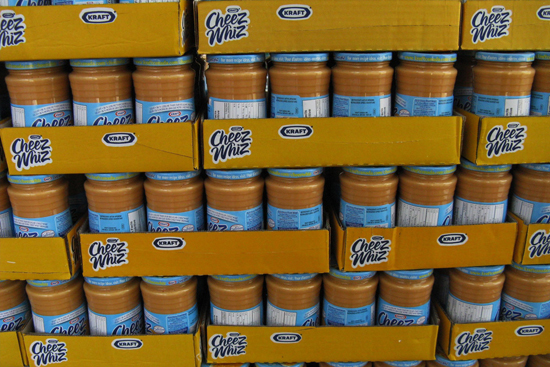Industrialized Food a Killer—and a Lifesaver
CAS course focuses on pros and cons of what we eat

Fish farms, such this one in Shanghai, supply the high demand for this staple of Asian food culture, while critics pan their effect on the environment and sea life. Photo by IvanWalsh.com
Class by class, lecture by lecture, question asked by question answered, an education is built. This is one of a series of visits to one class, on one day, in search of those building blocks at BU.
Modern fish farms are a capitalist-industrial obscenity—desecrating the environment, sickening the fish, and fueling overharvesting of wild fish to feed the ones we’re farming. We need to change our culinary culture (eat less fish) and replace some succulent favorites, like salmon, with new species that can be raised less harmfully. So argues Paul Greenberg in his well-reviewed book Four Fish, one text used in Karen Pepper’s writing class, and during one class, several students presented papers backing Greenberg.
Whoa, objected one. “In Asian countries, fish are, like, a staple,” she observed. “That is part of the food culture.”
“That’s a very important point,” Pepper noted. “Greenberg obviously is writing from an American perspective.” Kelly Ducey (CAS’15), one of the presenters, countered that international regulations protect some fish species worldwide, not just in the United States. But Greenberg’s point is debatable, she conceded. “We are arguing for it. We think it’s also easy to argue against it.”
The pros and cons of industrialized food production make up the mixed buffet Pepper serves in Source and Sorcery: All About Food. The College of Arts & Sciences lecturer is a longtime patron of community-supported agriculture, and she hopes students leave her class understanding “the fragility of life and our connection to nature.” But she also thinks food snobs disregard the lifesaving benefits of our mass-production food system and the cultural and economic reasons behind people patronizing its products. (She also doesn’t want to be hypocritical by plugging food fads like the buy-local movement: “I love French cheese and wine, so no, I don’t get the gold star there.”)
“Our current food system was an incredible milestone,” Pepper says in an interview. “Every human being who has ever lived on this Earth has wanted a secure food supply; you and I take it for granted. We can only live any kind of creative or imaginative life if we have a guaranteed food supply. Otherwise, we’re foragers; we’re animals.”

And with government farm subsidies making certain mass-produced, processed foods cheap to eat, “I don’t want to make students feel uncomfortable if they’ve been brought up in a household where there are often financial decisions about food,” she says. Many students face monetary and time constraints and mandatory meal plans, all of which crimp the ability to cook for yourself or take a money’s-no-object approach to grocery shopping, so Pepper is not interested in proselytizing, but in getting students up to speed on the food system so they can “make their own judgments.”
Yet this Renaissance woman, who studied history and creative writing before taking a PhD in microbiology, also worries about the system’s environmental fallout, and the course’s opaque name hints at these concerns. Source, of course, means food as the source of life, but it also refers to the fact that most Americans no longer raise or grow their food and don’t know where it comes from or how it’s made. Sorcery “is what is done to our food,” she says, “the sort of gimmickry, really, of the food industry,” from processing to genetic modification.
The CAS Writing Program offers courses on numerous topics to teach students to draft sharply reasoned arguments. In addition to Greenberg’s book, the syllabus for this class includes excerpts from Michael Pollan’s best-selling The Omnivore’s Dilemma, valuable especially for the way it shows Pepper’s writing class how to write and defend an argument. (In a New York Times piece, Pollan famously boiled down his philosophy to three sentences: “Eat food. Not too much. Mostly plants.”)
“This class has really opened my eyes to what’s in the food I eat,” says Ducey, who now reads the ingredients in all the food she buys. “I found it very disheartening to learn the fact that most of our foods look identical while being processed. I don’t thinks my views on what I eat have changed that much, although I have been eating more fruits and vegetables since I entered this class.”
This Series
Also in
One Class, One Day
-
November 30, 2018
Breaking Bad Director Gives CAS Class the Inside Dope
-
October 31, 2018
Trump and the Press: We’ve Been Here Before
-
August 3, 2018
A Scholarly Take on Superheroes

Comments & Discussion
Boston University moderates comments to facilitate an informed, substantive, civil conversation. Abusive, profane, self-promotional, misleading, incoherent or off-topic comments will be rejected. Moderators are staffed during regular business hours (EST) and can only accept comments written in English. Statistics or facts must include a citation or a link to the citation.